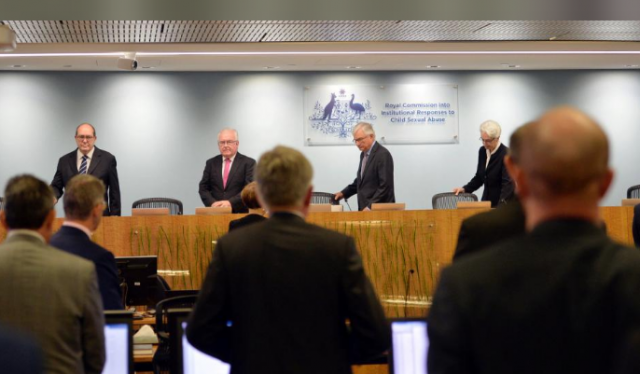Sex abuse cases: Australian archbishop defends secrecy of confession
Religious institutions across country have been scrambling to underscore importance of secrecy in confessionals

Officials from the Royal Commission into Institutional Responses to Child Sexual Abuse arrive on the opening day of their public hearing. PHOTO: REUTERS
Archbishop Denis Hart of Melbourne said on Tuesday that, “he would rather go to jail than breach the seal of confession". He is a representative of the Roman Catholics in the country, and is also the head of the Australian Catholic Bishops Conference.
Adviser to Pope back in Australia to face abuse charges
“The laws in our country and in many other countries recognize the special nature of confession as part of the freedom of religion, which has to be respected,” Archbishop Hart said while talking to the Australian Broadcasting Corporation.
The statement came merely hours after Australia’s Royal Commission into Institutional Responses to Child Sexual Abuse suggested a number of policy changes to old laws, one of which would direct priests who hear about sexual abuse during a confession to report it.
Religious institutions across the country have been scrambling to underscore the importance of secrecy in confessionals. The 85 recommendations by the commission are intended to reform Australia’s criminal justice system by providing a better response to sex abuse victims.
“There should be no excuse, protection nor privilege in relation to religious confessions,” the report said. “We heard evidence that perpetrators who confessed to sexually abusing children went on to re offend and seek forgiveness again.”
Sex harassment widespread in Australian police: survey
Archbishop Hart reacted to the developments on Tuesday, saying: “I think priests are men who are very carefully trained. Priests in my diocese in Melbourne are very conscious of the difficulties of the present situation.”
He added, “We want to be faithful to God and faithful to our vows, but we do want to be responsible citizens, and we’re totally committed to that.” The suggestion, made as the commission is investigating the church’s response to sexual abuse cases in recent times, has invited hard-hitting criticism. The issue isn’t new though. In 2012, when the commission was formed, there were already discussions about the responsibility of priests to report child sex abuse cases they had learned of during confessions to the police.
“Such an obligation would undoubtedly enhance protection of the rights of children,” Prof. Sarah Joseph, director at the Castan Center for Human Rights Law at Monash University in Melbourne, made public in 2012. “It would also interfere with the freedom of religion of priests if they are compelled to reveal information conveyed during formal ‘confessions.’” She also said, “In this clash of rights, which should prevail?”
'Disturbing' sexual harassment at Australian universities
The fate of the report on criminal justice and the recommendations it has published is still unknown. The commission is expected to publish its report in a few months.
On Tuesday, Professor Joseph said legislative options were still on the table. “There’s a lot of sentiment on the side of the Royal Commission and a lot of disgust at a lot of the things that are being uncovered.”
The Royal Commission has looked into sex abuse cases in a number of Australia’s religious institutions, including those that pledge allegiance with the Anglican Church, the Jehovah’s Witnesses and Orthodox Judaism. It reported that about 7 percent of Catholic priests in Australia have been accused of sexually abusing children between 1950 and 2010.
This article originally appeared in The New York Times.


















COMMENTS
Comments are moderated and generally will be posted if they are on-topic and not abusive.
For more information, please see our Comments FAQ